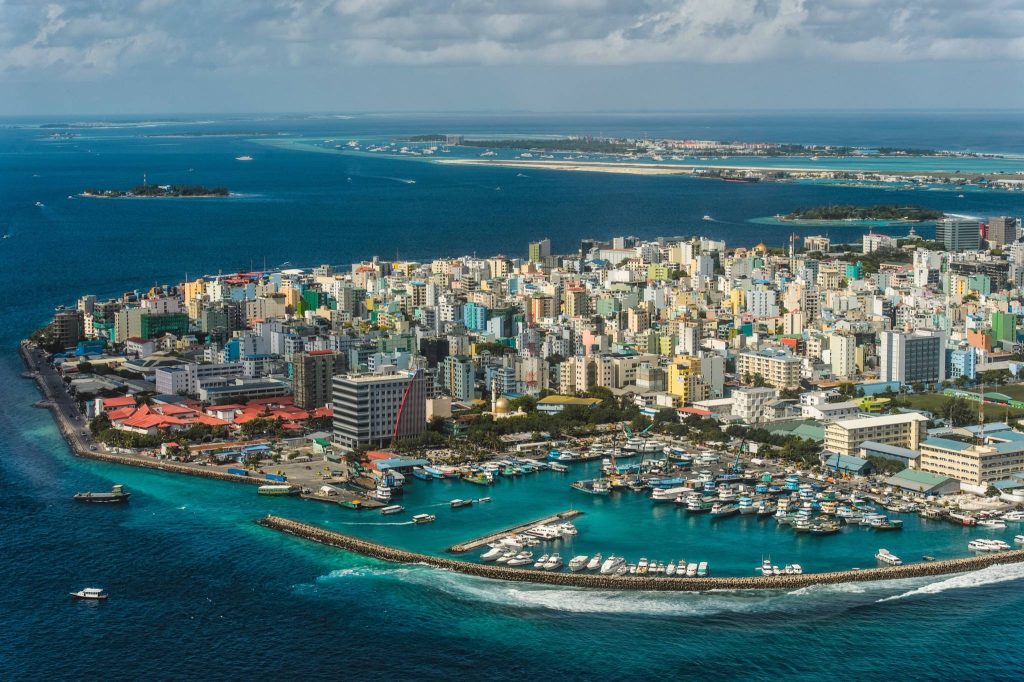Addressing the World Governments Summit 2024 in Dubai, President H. E. Dr Mohamed Muizzu recently outlined the government’s vision of compiling and implementing a 20 year development plan[1]. One incident immediately sprang to mind with this announcement.
It was 28 September 2022. I had just arrived at Sh Funadhoo with 2 of my colleagues, and we were heading from the jetty to the Atholhuge, where we were to be residing for the next 3 days. We were there for a training workshop for councilors and WDC members of Shaviyani Atoll and some representatives of other institutions, focusing on familiarizing with aspects of the Decentralization Act, other relevant legislation, and development planning. On the way, Shaviyani Atoll Council President Shiyam and his colleagues thanked our team for making required adjustments to our travel dates, because they coincided with scheduled trips of other government authorities as well. On remarking they must have had their hands full, he informed me they had been occupied the previous month and this one as well, because there were so many workshops taking place. I was told three ministries and one independent state institution had been to Shaviyani Atoll in the recent weeks. They had all met the councils, WDCs, other state institutions, civil society, even the parent teacher associations of schools. All of them, separately. This practice was not unique to one administration; this was the way things have been done for as long as civil servants of various institutions I quizzed on it remembered, and some had been in service for over two decades.
By the time we arrived at our lodging, a single thought occupied my mind. If we are to talk about development planning, we must talk about streamlining our resources. Shaviyani Atoll Council and all of the atolls’ 16 island councils had been occupied preparing for these sessions and workshops, making the necessary arrangements, coordinating the logistics. I knew how consuming this must be, because these councils are exceptionally conscientious and exemplary in the hospitality they extend. Everyone who had been invited to these events had made time constantly because there were teams from Male who requested their audience, numerous times over the span of a few days.
Duplication and wastage of resources; too many chefs in one small kitchen?
When we talk about national level long term development planning it is not surprising to focus on the ‘big stuff’. The million-dollar mega projects. The flamboyant renderings and images. The awe-inspiring visual presentations. But there is wisdom in scrutinizing the seemingly small things; those that seem trivial but could have an immense impact. Streamlining the use of our available resources is one I would like to see addressed in any short- or long-term plan.
Why is this important? The 3 ministries and the independent institution, in this case, had conducted sessions on very similar and overlapping issues – social cohesion, awareness of social issues especially concerning young people and students, and community engagement to address these issues. Digging further into the matter, I understood each entity operated individually and had no knowledge of the other’s programs on similar themes within the same period. To me, it appeared to be a massive wastage of resources and duplication of work. Staff from 4 authorities had prepared for these trips, paid for by the taxpayers, and spent their time and energy which they could have diverted to other meaningful work falling under their mandate. Councils were too occupied with undertaking arrangements requested of them, while they too had pressing mandated work to attend to piling up on their plates. These teams would continue to formulate projects and implement policy as silos within the broader administration, when concerted efforts will result in efficiency and significantly less wastage of resources.
The purpose of a Strategic Action Plan, is also to direct the necessary resources as and where needed. But administration after administration, we witness the prioritizing of political whims and catering to wish-lists, which end up compromising development goals we seem to begin with. It is imperative to ensure any development plans, be it for 3 years or 30, are not painstakingly compiled only to be sacrificed for political gain and expediency.
Moving forward, looking back

While national development plans have sometimes been considered relics of direct economies and state led development in the 80s and 90s, there has been a resurgence in the number of countries compiling national development plans[2]. The number of countries with a national development plan has more than doubled, from roughly 62 in 2006 to 134 in 2018, and one of the main factors driving this re-emergence could be attributed to the need to plan for the Sustainable Development Goals (SDGs) since 2015[3]. Even though national development planning brings to mind some failures of centrally planned economies in the past, and there is reason to be ambivalent, we must not rush to dismiss such planning as archaic and outdated. Governments have turned to ‘new national planning’, which is largely “a practice-led paradigm with a body of knowledge, concepts and practices that relate both to state responses to economic globalization and to how they plan to implement Agenda 2030 for Sustainable Development”, displaying distinct differences from the old concepts of national planning[4].
While the Maldives too, seems to be gearing towards embarking on an ambitious project of development planning, there are numerous factors to consider reflecting on previous experiences. Ensuring the streamlining of resources through efficient strategies and synergy among state institutions to ensure development goals and objectives are realized, is one priority. Of equal importance are inclusion of diverse stakeholders and transparency of both planning processes and finalized plans. UNDP’s study on mainstreaming poverty reduction in national development plans highlights the significance of these factors to ensure continued success of both planning processes and plans[5].
Local governance and national planning
A cause for concern has been the frequent exclusion or sidelining of local governance tiers in planning dialogue and processes. Even if there was involvement and contribution sought from the local government actors, not being privy to the finalized plans was an issue raised by many local councils. As mandated by the 8th amendment to the Decentralization Act, city and island councils were required to compile and submit landuse plans and development plans, which was in itself a complicated task for many that lacked technical and financial resources. The situation was further exacerbated because they lacked knowledge and information on national plans. While councils and communities debated and decided on which resources to allocate where and how and for what purpose, administrations might have different plans in mind leading to misaligned priorities and mismanaged resources that fail to deliver on most pressing issues for specific communities. If all the landuse plans and development plans compiled by island and city councils and national plans are easily accessible and visible, councils can seek avenues for collaboration with other councils within the atoll or at inter atoll levels as well. Furthermore there is the possibility of drawing local and international investors, donors and aid agencies who might have interest in relevant programs and projects outlined in island, atoll, city and national level plans, thus directing funds to where it will be best utilized. Streamlining resources can be greatly facilitated with this degree of transparency as well.

Community inclusion is increasingly being embraced in national development planning, rather than being state-driven and solely relying on the knowledge and expertise of technical professionals. Out of 107 development plans analyzed by Chomhowu, Hulme and Munro, approximately 42% are bottom-up, collaborative plans with a strong evidence base and high social embeddedness[6]. The authors of the study assert that the process of building national consensus is just as important as the contents of the plan itself, and ‘communicative rationality’ appears to be the most preferred approach to planning especially with regards to countries’ aspirations towards attaining SDGs[7].
Streamlining resources, inclusion and transparency might be perceived as issues of lesser significance, but they have profound impact at local governance levels. In articulating the social, economic and environmental aspirations of a country, issues and solutions at a grassroots level need to be identified and prioritized.
Recommendations for streamlining, inclusion and transparency in national level development planning
- Ensuring the engagement, participation and contribution of local governance tiers and communities in planning discussion and processes
- Two-way communication with regards to planning processes and transparency in sharing finalized plans with local governance tiers and communities
- Accessibility to all sector, island, atoll, city and national level plans made available on a single platform open to all
- Regular consistent monitoring of plans to ensure goals and objectives are being met as envisioned and making necessary amendments, prioritizing the best utilization of resources
- A frequent complaint regarding development plans is the constant change in policy directives with every change of administration. To prevent radical shifts from development goals or ad hoc decisions driven by political influence, an independent National Planning Commission to be established that will ensure both the efficient coordination and streamlining of resources, and continuation of development projects and programs following electoral cycles
- Every institution identifying key technical personnel to liaise with the National Planning Commission to ensure the Commission’s undertakings are not hindered by bureaucratic complications as well as facilitate effective cross sectoral engagement
- Garnering and building national consensus for shared vision and aspirations and fostering engaged, responsible citizenry

[1] https://presidency.gov.mv/Press/Article/29857
[2] Chimhowu A.O, Hulme D., Munro L.T., ‘The ‘New’ national development planning and global development goals: Processes and partnerships’, August 2019 https://www.sciencedirect.com/science/article/pii/S0305750X19300713
[3] Ibid
[4] Ibid
[5] UNDP, 2015 https://www.undp.org/sites/g/files/zskgke326/files/publications/Chapter-4.pdf
[6] Chimhowu A.O, Hulme D., Munro L.T., ‘The ‘New’ national development planning and global development goals: Processes and partnerships’, August 2019 https://www.sciencedirect.com/science/article/pii/S0305750X19300713
[7] Ibid



